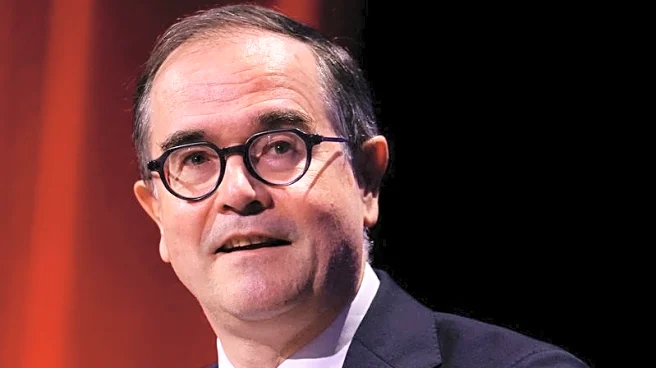What's Happening?
The Los Angeles Olympics organizing committee has announced plans to sell naming rights for several venues in the 2028 Games, marking a significant shift in the International Olympic Committee's traditional policy against brand names on arenas and stadiums. This decision is expected to generate substantial revenue, contributing to the $6.9 billion budget for the Games. Contracts have already been secured with Honda and Comcast, which will have naming rights for the volleyball arena in Anaheim and the temporary squash venue, respectively. LA28 chairman and CEO Casey Wasserman emphasized the necessity of this move, given the private funding model of the American-hosted Olympics, which lacks government financial backing. The naming rights will be available for up to 19 temporary venues, with the IOC's top sponsors having the first opportunity to participate.
Why It's Important?
This development is crucial as it represents a paradigm shift in Olympic branding and funding strategies, particularly for the U.S., where private enterprise plays a significant role in hosting the Games. By selling naming rights, the LA Olympics can secure additional funding without relying on government support, potentially setting a precedent for future Olympic events. This approach could influence how cities bid for and host the Olympics, making it more financially viable and attractive. The move also highlights the unique position of Los Angeles in reshaping Olympic traditions, as seen in previous Games hosted by the city.
What's Next?
The organizing committee will continue to negotiate naming rights deals, with the IOC's top sponsors having priority access. If agreements are not reached with certain venues, such as SoFi Stadium or Intuit Dome, no alternative sponsors will be allowed to rename these locations. The committee will also implement major scheduling changes, including moving track and field events to the opening week and swimming to the closing week of the Games. These adjustments, along with the introduction of new sports like flag football, demonstrate Los Angeles' influence in modernizing the Olympic format.
Beyond the Headlines
The decision to sell naming rights could have broader implications for the cultural and ethical dimensions of the Olympics. It challenges the traditional view of the Games as a non-commercial event, potentially altering public perception and the Olympic brand. This move may also spark discussions on the balance between commercial interests and the preservation of Olympic ideals, as well as the impact on local communities and historical venues.












